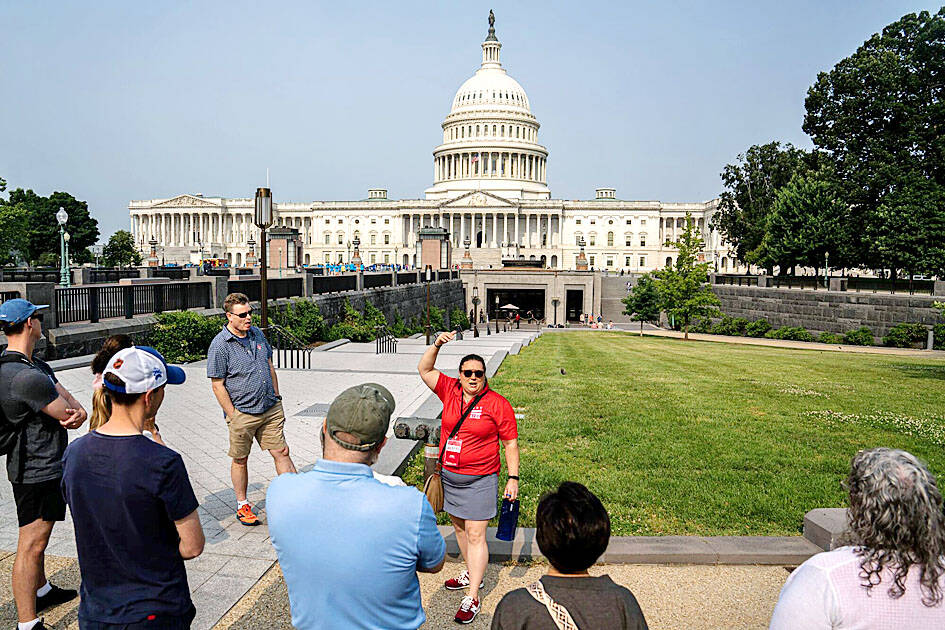The US Senate was yesterday set to take up a bill to lift the government’s US$31.4 trillion debt ceiling, with just four days left to pass the measure and send it to US President Joe Biden to sign, averting a catastrophic default.
The top Democrat and Republican in the chamber vowed to do all they could to speed along the bill negotiated by Biden and US House of Representatives Speaker Kevin McCarthy, which would suspend the debt limit until Jan. 1, 2025, in exchange for a cap on spending.
It remained to be seen whether any members of their respective caucuses, particularly hardline Republicans angry the bill did not include deeper spending cuts, would use the Senate’s arcane rules to try to slow down its passage.

Photo: Bloomberg
The US Department of the Treasury said that it would be unable to pay all its bills on Monday next week if the US Congress fails to act.
The Republican-controlled House passed the bill on Wednesday evening in a 314-117 vote. McCarthy lost the support of dozens of his fellow Republicans.
“Once this bill reaches the Senate, I will move to bring it to the floor as soon as possible,” Senate Majority Leader Chuck Schumer said on Wednesday.
Senate Minority Leader Mitch McConnell also signaled that he would work for fast passage, saying: “I’ll be proud to support it without delay.”
Biden’s Democrats control the Senate by a thin 51-49 margin. The chamber’s rules require 60 votes to advance most legislation, meaning at least nine Republican votes are needed to pass most bills, including the debt ceiling deal.
The measure faces opposition from the right, with some Republicans angry the spending cuts were not deeper, and left, with some Democrats opposed to new work requirements imposed on some anti-poverty programs.
However, most lawmakers acknowledged they could not stomach the prospect of barreling ahead into default.
Schumer and McConnell were working behind the scenes to dissuade opponents from erecting procedural barriers that would delay passage.
Typically on important, contentious bills such as this one, the two Senate leaders find a way to allow just a couple of rebelling senators from each party to offer amendments under fast-track procedures, knowing they would lack the votes for passage.
“Unless you want to stay here through the weekend, I think some of our guys are going to need to get their votes” on their amendments, US Senator John Thune said.
Any Senate changes to the bill at this stage would mean it would have to go back to the House for final passage, a delay that could make the first-ever US government default a reality.
Republican US Senator Rand Paul who regularly seeks such last-minute amendments, told CBS News on Wednesday that he would not employ parliamentary procedures to delay action.

The US government has signed defense cooperation agreements with Japan and the Philippines to boost the deterrence capabilities of countries in the first island chain, a report by the National Security Bureau (NSB) showed. The main countries on the first island chain include the two nations and Taiwan. The bureau is to present the report at a meeting of the legislature’s Foreign Affairs and National Defense Committee tomorrow. The US military has deployed Typhon missile systems to Japan’s Yamaguchi Prefecture and Zambales province in the Philippines during their joint military exercises. It has also installed NMESIS anti-ship systems in Japan’s Okinawa

TRAGEDY STRIKES TAIPEI: The suspect died after falling off a building after he threw smoke grenades into Taipei Main Station and went on a killing spree in Zhongshan A 27-year-old suspect allegedly threw smoke grenades in Taipei Main Station and then proceeded to Zhongshan MRT Station in a random killing spree that resulted in the death of the suspect and two other civilians, and seven injured, including one in critical condition, as of press time last night. The suspect, identified as a man surnamed Chang Wen (張文), allegedly began the attack at Taipei Main Station, the Taipei Fire Department said, adding that it received a report at 5:24pm that smoke grenades had been thrown in the station. One man in his 50s was rushed to hospital after a cardiac arrest

‘WIN-WIN’: The Philippines, and central and eastern European countries are important potential drone cooperation partners, Minister of Foreign Affairs Lin Chia-lung said Minister of Foreign Affairs Lin Chia-lung (林佳龍) in an interview published yesterday confirmed that there are joint ventures between Taiwan and Poland in the drone industry. Lin made the remark in an exclusive interview with the Chinese-language Liberty Times (the Taipei Times’ sister paper). The government-backed Taiwan Excellence Drone International Business Opportunities Alliance and the Polish Chamber of Unmanned Systems on Wednesday last week signed a memorandum of understanding in Poland to develop a “non-China” supply chain for drones and work together on key technologies. Asked if Taiwan prioritized Poland among central and eastern European countries in drone collaboration, Lin

ON ALERT: Taiwan’s partners would issue warnings if China attempted to use Interpol to target Taiwanese, and the global body has mechanisms to prevent it, an official said China has stationed two to four people specializing in Taiwan affairs at its embassies in several democratic countries to monitor and harass Taiwanese, actions that the host nations would not tolerate, National Security Bureau (NSB) Director-General Tsai Ming-yen (蔡明彥) said yesterday. Tsai made the comments at a meeting of the legislature’s Foreign Affairs and National Defense Committee, which asked him and Minister of National Defense Wellington Koo (顧立雄) to report on potential conflicts in the Taiwan Strait and military preparedness. Democratic Progressive Party (DPP) Legislator Michelle Lin (林楚茵) expressed concern that Beijing has posted personnel from China’s Taiwan Affairs Office to its